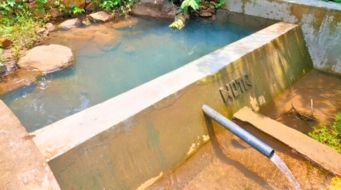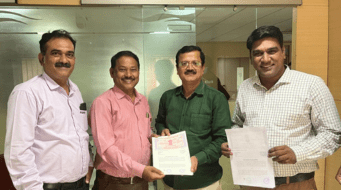by Dr. Marcella D’Souza
On 19th November 2021, WOTR with IDH and eight other partners, launched ECOBARI – a collaborative aimed to promote Ecosystem Based Adaptation for Resilient Incomes. The event witnessed over 150 participants.
ECOBARI received a huge support from the development fraternity; it is seen as a major step in fostering climate change adaptation and supporting the incomes of marginalized communities in rural India. We, at WOTR, are immensely proud of this development.
COP26 highlighted the increasing global concern over the adverse impact of climate change on our ecosystems that has especially disrupted the lives of the underprivileged. Frequent floods, forest fires, spells of drought and such natural calamities are fast becoming the new normal. While this is deteriorating the overall quality of life for everyone, climate change is majorly wreaking havoc on the livelihoods of rural and tribal communities where agriculture and forest produce are their lifeline. But that’s not where it ends. The ripple effect is on the entire nation, as seen in the rising hunger and malnutrition, inflation, widening socio-economic gap and declining human development index.
Perhaps, the recent COVID pandemic is a wake-up call in this context. It is an urgent nudge to build resilience as we secure the health of planet and its people. A collaborative approach to implementing nature-based solutions is indeed the only way to regain the ecological balance.
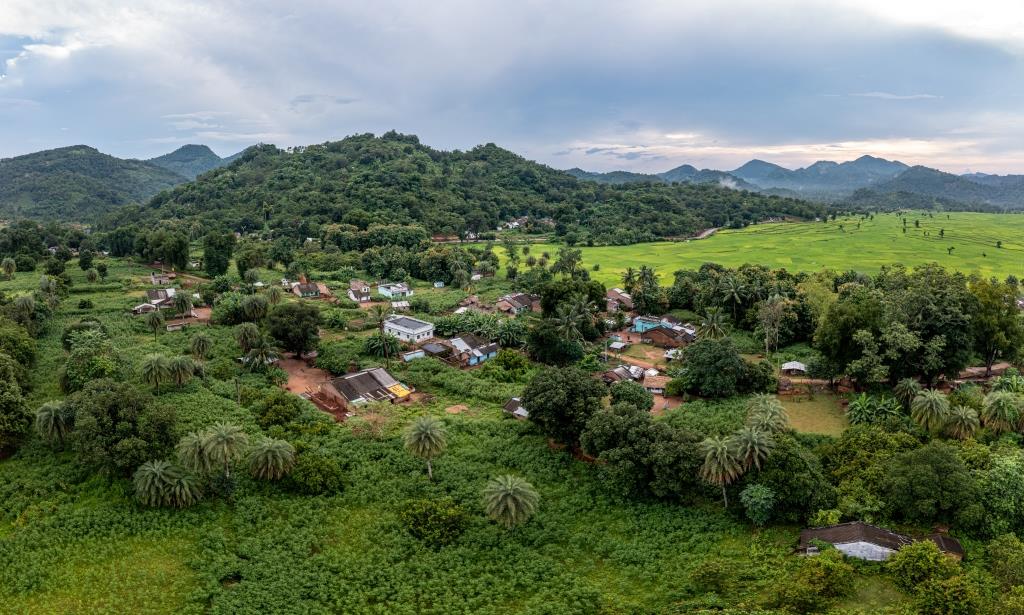
With nearly three decades of persistent work in ecosystem restoration and building climate resilience, WOTR has successfully transformed the lives and livelihoods of people across several villages in India. On this robust foundation of extensive experience and a rich knowledge pool, WOTR is now ready to join hands with like-minded organizations and individuals, to successfully upscale Ecosystem-based Adaptation (EbA) in India. The aim is to accelerate our pace and amplify the impact of EbA to achieve the sustainable development goals.
ECOBARI is a promising development in this direction.
“Collective action is the pressing need of the hour to address ecosystem degradation and climate change. India’s focus has always been on sustainable and equitable growth. We welcome initiatives such as ECOBARI to contribute to the goals of the Paris Agreement and UN Climate Change Conference, Post-2020 Biodiversity Framework and UN Decade on Ecosystem Restoration.” Jigmet Takpa (Joint Secretary, Ministry of Environment, Forest and Climate Change)
ECOBARI – Vision, Mission and Roadmap
The concept of ECOBARI emerged from a series of workshops organized by WOTR and TMG Research between 2019 and 2021, where stakeholders representing the central and state governments, research and academia, practitioner organizations, donors, community representatives, media and others discussed Ecosystem-based adaptation as a means to addressing climate change.
ECOBARI is the abbreviation for Ecosystems Based Adaptation for Resilient Incomes. In many Indian languages ‘Bari’ means ‘Home’. Since we are all dependent on one ecosystem or the other, for us ECOBARI also represents ‘Ecological Home’. We present the Vision, Mission and Roadmap of the initiative.
Vision
Empowered communities sustainably regenerate and manage their ecosystems, conserve biodiversity, derive resilient incomes and improve their quality of life through nature-based solutions, as they adapt to climate change.
Mission
To be a leading platform that grounds Ecosystem-based Adaptation at scale through multi-stakeholder partnerships, policy enablement and resource provisioning, so as to contribute to the country’s SDGs, the Land Degradation Neutrality targets and climate change commitments.
Roadmap
To begin with, ECOBARI has devised a roadmap (2021-2030) that aims to achieve the following objectives:
- Develop a broad framework for EbA and create a shared understanding of it, as well as foster political and societal will for promoting EbA among various stakeholders.
- Develop a toolkit to mainstream and integrate EbA approaches in different policies and programmes.
- Capacity building of stakeholders and upscaling of EbA.
- Ensure sustained, adequate funding.
- Assess the progress by establishing monitoring, evaluation and learning systems.
- Contribute to the state, national and global goals through EbA.
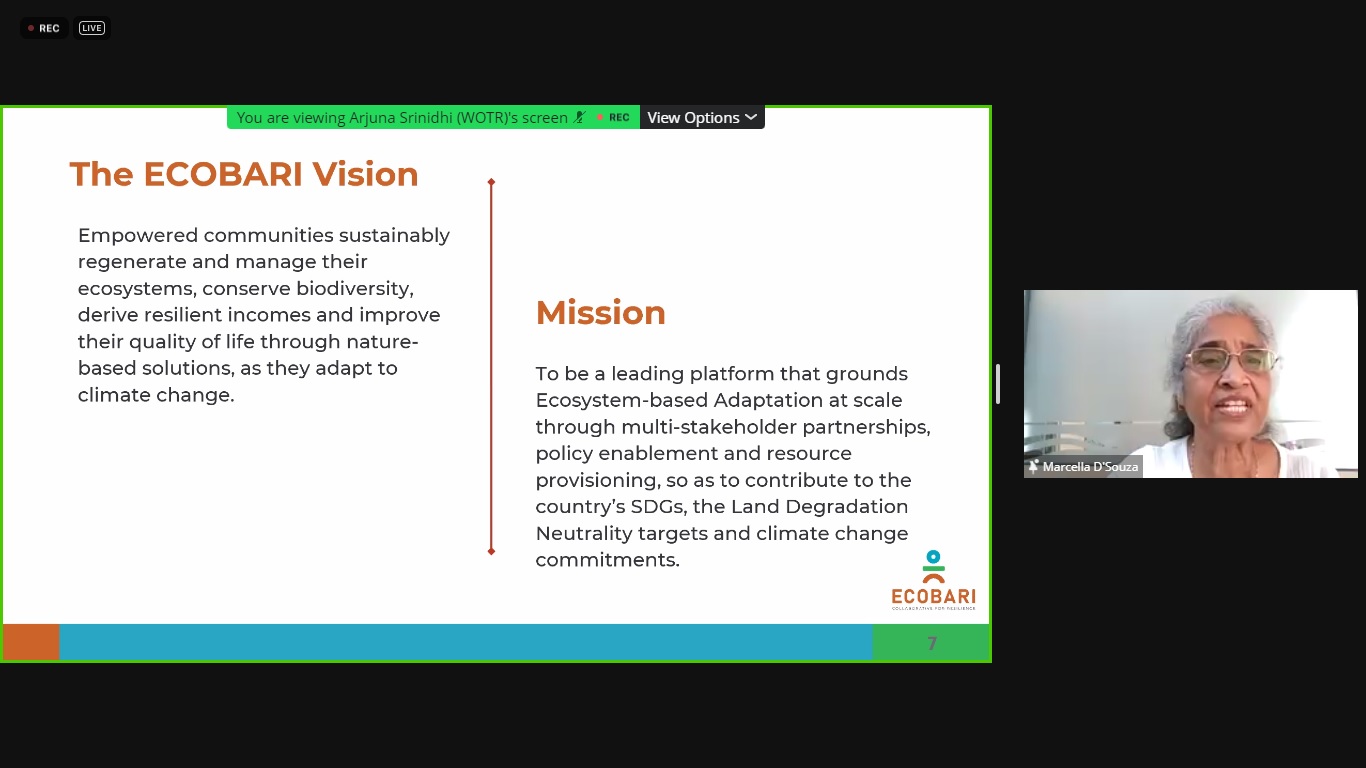
The ECOBARI collaborative welcomes participation from all stakeholder groups including research, government, NGOs, CBOs, corporate & funders, financial institutions, media and the citizens. Currently, the primary thematic areas of focus are – biodiversity, land, forest and water, agriculture, livestock and income generation.
The participation may be in various forms. This includes, but is not limited to:
- Share domain expertise – scientific knowledge, training, capacity building, etc.
- Contribution to the knowledge pool – case studies, experiences, good practices and others.
- Implementation – including local business development
- Research – interdisciplinary research, action research, policy assignments.
- Contribute resources
- Bridge science-practice-business-policy
W-CReS is the promoter and convener and IDH is the Co-convener of ECOBARI. Our co-founding partners are – auctus ESG, Bharati Vidyapeeth (BVIEER), Credit Suisse, Echo Network, ISB-Bharati Institute of Public Policy, SOPPECOM, TMG Research, CIFOR-ICRAF.
The urgent need for a collaborative approach
During the event, Jes Weiglet (Head of Programs, TMG Research) acknowledged the impact of various organizations in reducing land degradation, improving afforestation and water conservation. He recognized the impact of climate resilient agriculture that has reportedly increased farmers’ incomes by 35%, which has significantly reduced distress migration. There are various organizations, institutions, and individuals striving to strengthen the ecosystems in their respective geographies and domains. However, in current times, when climate change is ruining the ecological balance much faster than was anticipated, we do not have the luxury to wait and witness the organic growth of our efforts. We must upscale and do it fast.
Ecosystem restoration and climate change adaptation is a goal that requires consistent, long-term, strategic efforts. Considering the size and scale of challenges in rural India, any single agency or even a few working together, cannot respond effectively.
The requirement for every project differs depending on the geographical location, biodiversity as well as the social and cultural fabric. ECOBARI catalyses the process of assessing these varied requirements and encourage organizations to share their expertise and knowledge for sustainable ecosystems to support the health of our planet and people. The collaborative also encourages an evidence-based approach that will play a crucial role in addressing policy-level changes.
Key points from the speakers
“Stakeholders now need to work parallely, and not sequentially.” (Dr. Ashok Dalwai, CEO NRAA, Ministry of Agriculture & Farmers Welfare, GoI)
“Every stakeholder will find some value by adopting the approach of ECOBARI. People and organizations working on different aspects need to come together to ground this approach and see it flowering.” (K J Joy, SOPPECOM)
“It is also important to remember that ecosystem-based adaptation begins and ends with people. People maintain or destroy the ecosystems.” (Ravi Prabhu, CIFOR-ICRAF)
Creating synergies through diversity
An ecosystem is a complex and dynamic subject comprising several inter-dependent nuances. There is no short cut to reach the goals. The endeavour requires rigorous, continued efforts that can only be achieved when experts and locals in the space come together and share knowledge, experience and resources.
A panel discussion organized during the ECOBARI launch event highlighted the importance of strategic collaborations to achieve India’s sustainable goals in nature-friendly ways. The panelists included experts from diverse fields and industries including research, academia, social development, finance and policymaking. The session was moderated by Dr. Shannon Olsson (the echo network) and the panelists were Dr. Milind Majumdar (IITM, India), Ms Sandhya Edlabadkar (Mahila Jagrut Samaj), Ms. Namita Vikas (auctus ESG) and Dr. Ashok Dalwai (NRAA, Ministry of Agriculture & Farmers Welfare, GoI).
Here are a few important points highlighted during the session.
- Promote the collection and use of local data and conduct related research.
- Encourage technological innovation to promote sustainability (social, economic and cultural).
- Strengthen the agri-value chain and focus on creating demand-based agriculture.
- Build community ownership and ensure people’s participation, especially during micro-planning.
- Strengthen alternate livelihoods without adding to the burden to GHG emissions.
- Streamline investments and funding by leveraging empirical data to build strong business cases.
- Encourage citizen participation and support.
Watch the detailed panel discussion on this link
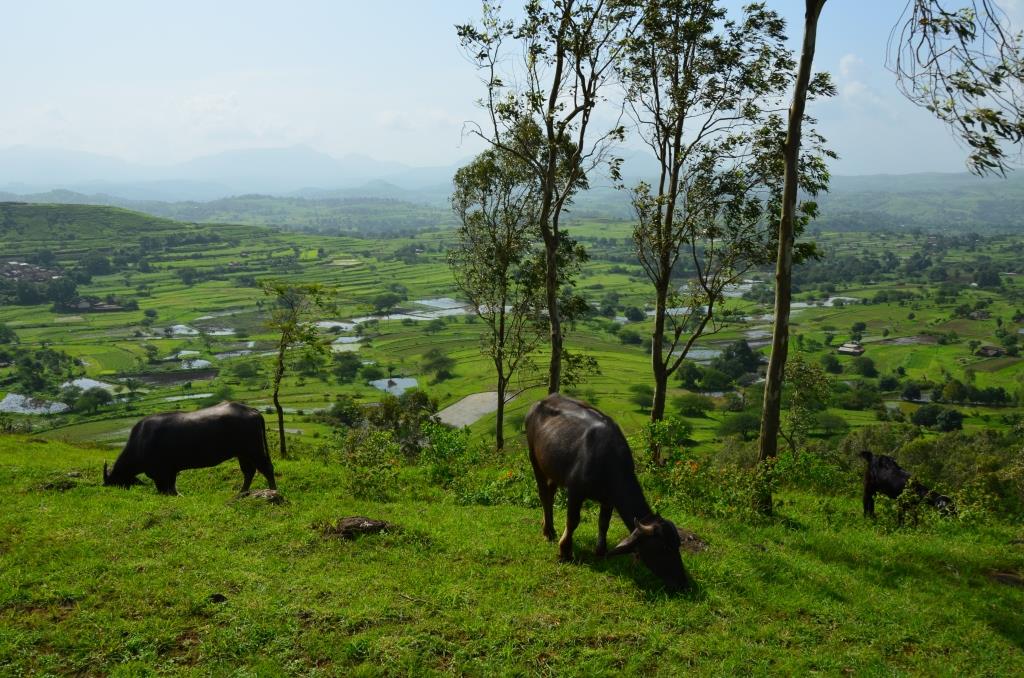
Conclusion
COP26 had not been as successful as expected, yet, we may consider this as a beginning of a new era. Ecosystem regeneration and nature-based solutions are important and urgent issues on the global agenda. Of course, all this should have been done much earlier, however, stakeholders must leverage the current opportunities and resolve to build climate change resilience with collective efforts.
While India faces the consequences of climate extremes in both the rural and urban arena, the country (with a large population and diverse expertise) can make significant transformation by implementing EbA and building resilient incomes. Now all stakeholders, including the Government, academia, grassroots organizations, thought leaders, policy makers, and individuals, must join hands and work in unison to protect mother earth and build a better tomorrow for the future generations.
ECOBARI presents a platform where stakeholders pool in ideas, efforts and resources to address the challenges of climate change and contribute to the national agenda and global sustainability goals. We invite stakeholders initiate a dialogue and contribute towards shaping the narrative around adaptation.
Interested organizations and individuals can join ECOBARI by filling up the membership form available at https://wotr.org/ecobari/
“Climate change is around us. Despite several resolutions and policies in the past, we didn’t take this issue seriously. We should now adopt a collaborative approach to protect our ecosystems. NOW is the time, we cannot push this subject for tomorrow. Sustenance and restoration of ecosystems is essential and should be married with people’s need to pursue sustainable livelihoods. ECOBARI is a great initiative in this regard.”
Vandana Chavan (MP, Rajya Sabha)

